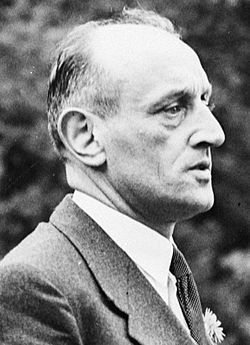Gerrit Jan van Heuven Goedhart facts for kids
Quick facts for kids
Gerrit Jan van
Heuven Goedhart |
|
|---|---|

Gerrit Jan van Heuven Goedhart in 1944
|
|
| United Nations High Commissioner for Refugees |
|
| In office 1 January 1951 – 8 July 1956 |
|
| Secretary-General | Trygve Lie (1951–1952) Dag Hammarskjöld (1953–1956) |
| Preceded by | Office established |
| Succeeded by | August R. Lindt |
| Senator of the Netherlands | |
| In office 22 October 1947 – 1 January 1951 |
|
| Minister of Justice | |
| In office 11 July 1944 – 23 February 1945 |
|
| Prime Minister | Pieter Sjoerds Gerbrandy |
| Preceded by | Jan van Angeren |
| Succeeded by | Pieter Sjoerds Gerbrandy |
| Personal details | |
| Born |
Gerrit Jan Goedhart
19 March 1901 Bussum, Netherlands |
| Died | 8 July 1956 (aged 55) Geneva, Switzerland |
| Political party | Labour Party (from 1946) |
| Other political affiliations |
Independent Social Democrat (1944–1946) |
| Spouses |
Francis Becht
(m. 1924; dissolved 1931)Erna Hauan
(m. 1932) |
| Children | Karin Sophie van Heuven Goedhart (1934–2013) Bergliot Halldis van Heuven Goedhart (born 1936) (second marriage) |
| Alma mater | Leiden University (Bachelor of Laws, Master of Laws, Doctor of Philosophy) |
| Occupation | Politician · Diplomat · Jurist · Journalist · Editor · Author |
Gerrit Jan van Heuven Goedhart (born March 19, 1901 – died July 8, 1956) was an important Dutch politician, diplomat, and journalist. He was a member of the Labour Party in the Netherlands. From 1944 to 1945, he served as the Minister of Justice. This meant he was in charge of laws and courts for the Dutch government. Later, he became the very first United Nations High Commissioner for Refugees (UNHCR) in 1951. He held this important role until he passed away in 1956.
Contents
Early Life and Career
Gerrit Jan van Heuven Goedhart was born in a town called Bussum in the Netherlands. His father was a church leader. Gerrit Jan first used the last name Goedhart. But in 1933, he added his mother's maiden name, van Heuven, to his own.
He studied law at Leiden University and finished his studies in 1926. Even before he graduated, he started working as a reporter for a newspaper called De Telegraaf. By the age of 28, he became the editor-in-chief, which means he was the main person in charge of the newspaper's content.
In 1933, he was fired from De Telegraaf. This happened because he refused to print an article that praised Adolf Hitler, the new leader of Germany. After this, he became the editor-in-chief of another newspaper, Utrechts Nieuwsblad. He worked there until Germany invaded the Netherlands.
World War II and Government Work
During World War II, the Netherlands was occupied by Germany. Gerrit Jan van Heuven Goedhart bravely worked for an illegal newspaper called Het Parool. This newspaper was part of the Dutch resistance, a secret group fighting against the German occupation.
In 1944, he had to escape to London. There, he was appointed Minister of Justice in the Dutch government in exile. This was the Dutch government that continued to operate from outside the country during the war.
Post-War Politics and the UN
After World War II ended, Gerrit Jan van Heuven Goedhart went back to Het Parool and became its editor-in-chief again. In 1947, he also became a Senator for the Labour Party. A senator is a member of a country's parliament, helping to make laws.
In 1951, he left both his newspaper job and his senator role. He took on a very important new job: the first United Nations High Commissioner for Refugees. The United Nations is an international organization that works for peace and cooperation. The High Commissioner for Refugees helps people who have been forced to leave their homes because of war or danger.
Under his leadership, the UNHCR received the Nobel Peace Prize in 1954. This award recognized their important work in helping refugees around the world.
Personal Life
Gerrit Jan van Heuven Goedhart was married twice. His first marriage to Francis Becht ended in 1931. In 1932, he married Erna Hauan from Norway. They had two daughters, Karin Sophie and Bergliot Halldis.
Gerrit Jan van Heuven Goedhart passed away in Geneva, Switzerland, on July 8, 1956. He was still serving as the United Nations High Commissioner for Refugees at the time.
Awards and Honours
Gerrit Jan van Heuven Goedhart received several important awards and honours for his work.
| Honours | ||||
| Ribbon bar | Honour | Country | Date | Comment |
|---|---|---|---|---|
| Knight of the Order of the Netherlands Lion | Netherlands | 30 April 1949 | ||
| Awards | ||||
| Ribbon bar | Awards | Organization | Date | Comment |
 |
Nansen Refugee Award | United Nations | 1956 | Given after he died |
| Wateler Peace Prize | Carnegie Foundation | 1956 | Given after he died | |
See also
 In Spanish: Gerrit Jan van Heuven Goedhart para niños
In Spanish: Gerrit Jan van Heuven Goedhart para niños
 | Isaac Myers |
 | D. Hamilton Jackson |
 | A. Philip Randolph |

